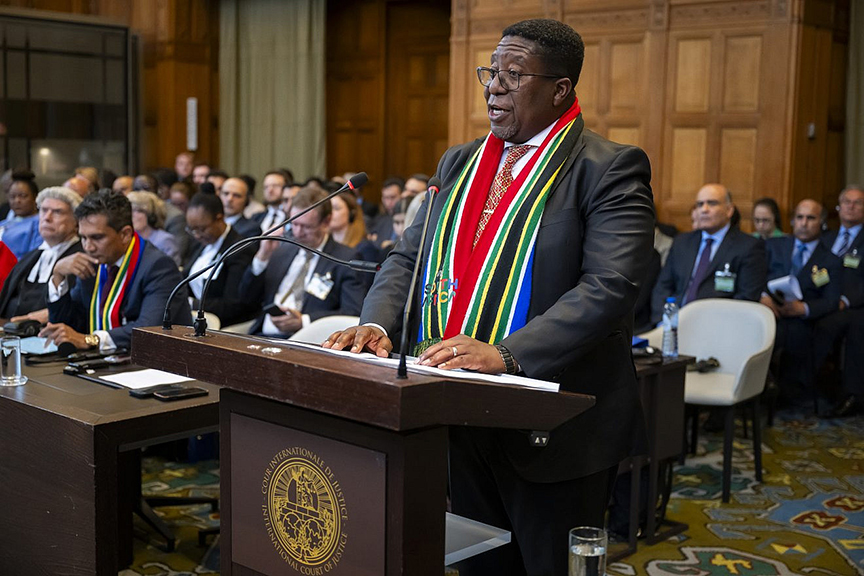Report: U.S. failed to inform Israel before announcing truce with agreement Hamas altered

Palestinians celebrate in Rafah, in the southern Gaza Strip, after Hamas announced its approval of a ceasefire on May 6, 2024. Photo by Abed Rahim Khatib/Flash90.
(JNS) — The Biden administration did not inform Jerusalem in advance of Hamas’s “acceptance” on May 6 of the latest hostage deal proposed by Egypt and Qatar, Axios reported on May 7, citing three Israeli officials.
The officials told the U.S. news outlet that the government was caught off guard by the Hamas announcement, the text of which it didn’t receive from the mediators until an hour after the terrorist group released its statement.
Upon reading the statement, Israeli officials reportedly were surprised to see “many new elements” that were not contained in the previous proposal to which Israel had agreed and was presented to Hamas by the American, Egyptian and Qatari mediators 10 days earlier.
“It looked like a whole new proposal,” one official told Axios political correspondent Barak Ravid.
Two senior Israeli officials said that the Egyptians gave Hamas a new proposal without coordinating it with Jerusalem. Another source familiar with the negotiations said that the U.S. invited Israel to Cairo over the weekend, but Jerusalem declined to send a delegation. One Israeli official said that it was a mistake not to have an Israeli team present at the talks.
According to the Israeli official, CIA Director William Burns and other Biden administration officials involved in the negotiations knew about the new proposal, but didn’t inform the Israeli side. The final version of the proposal was hashed out in Doha on the morning of May 6 with the Biden administration’s knowledge.
Burns spoke on the phone with Israeli Defense Minister Yoav Gallant that morning, a source said, but Gallant was also surprised when Hamas released the statement.
“Israel got played” by the U.S. and the mediators, two Israeli officials said. They drafted “a new deal” and were not transparent about it.
The Israeli officials said they suspect that the Biden administration gave Hamas guarantees via the Egyptians and Qataris about ending the war, which the terror group demands but which Jerusalem says is a nonstarter until Hamas is defeated, the hostages are released and Gaza never again poses a threat to Israel.
“We think the Americans conveyed the message to Hamas that it will be okay when it comes to ending the war,” one senior Israeli official said.
A U.S. official told Axios that the stated goal of the Biden administration is to “ensure that an initial six-week ceasefire would be built into something more enduring. The agreement lays out three phases for this purpose and it would be our aim to see all three phases completed with all the hostages returned to their families.”
The official said that the U.S. did not give any guarantees to Hamas about ending the war, and pushed back against the Israeli charges that they were left out of the process, saying that “American diplomats have been engaged with Israeli counterparts. There have been no surprises.”
Asked about the reports during a briefing on May 7, U.S. National Security Council spokesman John Kirby likewise stressed that Washington has had “sustained, ongoing normal” interactions with Israel since the start. “Nobody was hiding any footballs from anybody.”
Israel’s War Cabinet approved sending a delegation to Cairo for talks with the Egyptians and Qataris about the proposal that Hamas accepted, despite deep reservations. Burns is expected to be in the Egyptian capital when the Israel team arrives.
According to a report in Reuters, citing a senior Israeli official, Jerusalem was only sending a team of mid-ranking officials to Cairo to attempt to see if Hamas can be persuaded to change its position on the latest offer, which Jerusalem cannot accept.
“This delegation is made up of mid-level envoys. Were there a credible deal in the offing, the principals would be heading the delegation,” the official told Reuters.
Meanwhile, the New York Times, citing two sources familiar with the talks, reported that Hamas told mediators on May 6 that some of the 33 hostages who would be released in the first phase of a ceasefire deal would not be alive.
The first group of the more than 100 captives still held in Gaza since the Oct. 7 massacre includes women, elderly men, the ill and wounded. Israel initially demanded 40 hostages in the “humanitarian” category, but came to believe that Hamas did not have that many who fit the criteria.



